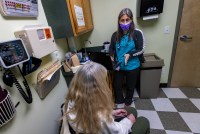Latest KFF Health News Stories
States Try to Obscure Execution Details as Drugmakers Hinder Lethal Injection
Pharmaceutical companies have put the brakes on many states’ ability to execute prisoners using lethal injections. Lacking alternatives, states are trying to keep the public from learning details about how they carry out executions.
$50 Billion in Opioid Settlement Cash Is on the Way. We’re Tracking How It’s Spent.
Spending the money effectively and equitably is a tall order for state and local governments, and a lack of transparency in the process is already leading to fears of misuse.
ER’s Error Lands a 4-Year-Old in Collections (For Care He Didn’t Receive)
A Florida woman tried to dispute an emergency room bill, but the hospital and collection agency refused to talk to her — because it was her child’s name on the bill, not hers.
GOP Lawmaker Calls for Tracking Homeless Spending, Working With Democrats on Mental Health
Republican state Sen. Roger Niello wants to know whether taxpayers are getting their money’s worth before spending more. Yet the fiscal conservative from the suburbs of Sacramento sees opportunities for bipartisanship on mental health.
Los datos de la investigación provienen del estudio Healthy Kids Colorado, una encuesta realizada cada dos años con una muestra aleatoria de 41,000 estudiantes de escuela media y secundaria.
Truly Random Drug Testing: ADHD Patients Face Uneven Urine Screens and, Sometimes, Stigma
Doctors have no national standards on when to order urine tests to check whether adult ADHD patients are properly taking their prescription stimulants. Some patients are subjected to much more frequent testing than others.
As Colorado Reels From Another School Shooting, Study Finds 1 in 4 Teens Have Quick Access to Guns
The study analyzed Colorado kids’ responses to how quickly they could get their hands on a loaded gun without their parents’ knowledge. More than 1 in 10 said they could do so within 10 minutes.
When College Athletes Kill Themselves, Healing the Team Becomes the Next Goal
Suicide is the second-leading cause of death among college students. Contrary to conventional wisdom, athletes aren’t immune from the risk factors. Players at Stanford University, the University of Wisconsin, and other colleges are learning how to protect their mental health and ask for help after their teammates killed themselves.
Banning Noncompete Contracts for Medical Staff Riles Hospitals
It’s about the money — on both sides — as arguments swirl about patient safety, rising prices, and paying back on-the-job training.
Journalists Delve Into Insulin Costs and Prior Authorization Policy
KHN and California Healthline staff made the rounds on national and local media this week to discuss their stories. Here’s a collection of their appearances.
Health Providers Scramble to Keep Remaining Staff Amid Medicaid Rate Debate
The ranks of community-based behavioral health providers in Montana have diminished amid rising costs, greater need, and stagnant Medicaid reimbursement rates. Now, as state lawmakers debate solutions, providers are hoping just to cover their costs.
Legal Questions, Inquiries Intensify Around Noble Health’s Rural Missouri Hospital Closures
A year after private equity-backed Noble Health shuttered two rural Missouri hospitals, a slew of lawsuits and state and federal investigations grind forward. Missouri Attorney General Andrew Bailey recently confirmed an “ongoing” investigation as former employees continue to go unpaid and cope with unpaid medical claims.
Fresh Produce Is an Increasingly Popular Prescription for Chronically Ill Patients
Fresh produce prescription programs are getting a boost in Montana as a way of helping people with chronic conditions such as diabetes and high blood pressure. The approach may be a model for other rural states to promote healthy eating in food deserts.
End of Covid Emergency Will Usher in Changes Across the US Health System
The May 11 expiration of the federal government’s pandemic emergency declaration will affect patient care across a broad range of settings, including telemedicine, hospitals, and nursing homes.
Prescription for Housing? California Wants Medicaid to Cover 6 Months of Rent
Gov. Gavin Newsom is making a bold push for Medicaid health plans to provide more housing support. He argues it’s cheaper to pay for rent than to allow homeless people to fall into crisis, which requires costly care in hospitals, nursing homes, and jails.
A Lot of Thought, Little Action: Proposals About Mental Health Go Unheeded
A recent report detailing problems with Florida’s patchwork mental health system had reached conclusions nearly identical to those of a similar report from more than 20 years ago. The echoes between the findings are unmistakable. And Florida isn’t the only state struggling with the criminalization of mental illness, a lack of coordination between providers, and insufficient access to treatment.
Mental Health Care by Video Fills Gaps in Rural Nursing Homes
In-person mental health care is hard to arrange in rural nursing homes, so video chats with faraway professionals are filling the gap.
Some Roadblocks to Lifesaving Addiction Treatment Are Gone. Now What?
The federal government has lifted restrictions on one of the most effective opioid addiction treatment medications. The change sets up a “truth serum moment”: Will mainstream doctors and nurses now treat addiction as a common disease?
Mobile Clinics Really Got Rolling in the Pandemic. A New Law Will Help Them Cast a Wider Safety Net.
Mobile clinics that provided covid-19 testing and vaccines at the peak of the pandemic are now being used to provide a range of health services in hard-to-reach communities. A law passed late last year allows qualified health care centers to use federal grants to expand the fleets.
Judge Signals He Could Rule to Halt Sales of Common Abortion Pill
A U.S. District Court case is being widely followed because the judge’s decision could overturn the FDA’s approval of mifepristone two decades ago. With abortion rights polling well even in red states, anti-abortion activists are increasingly turning to the courts to achieve their aims.

























